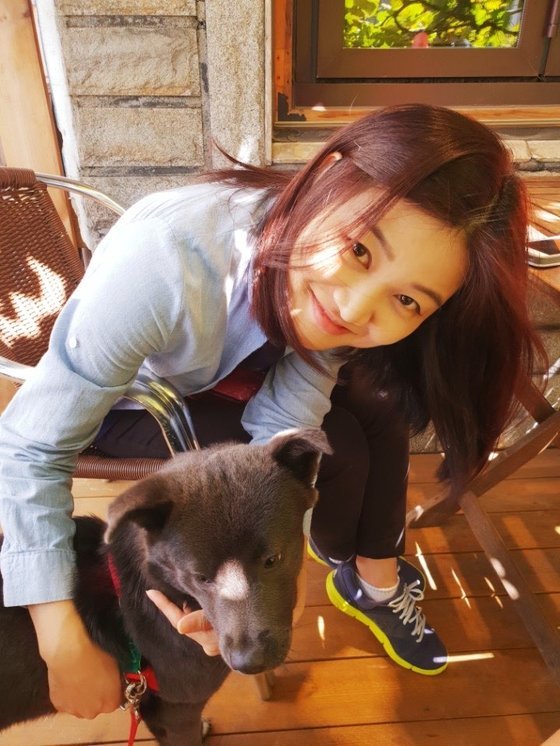In a country where news reports about animal cruelty and abandonment never stop, a group of pro bono lawyers is working to protect animals by filing suits on their behalf. Among their clients are mountain goats in danger of losing their habitat, and dogs dying in pain at meat farms.
Park Joo-yeon is one of 15 lawyers engaged in animal protection activities for the civic group People for Non-Human Rights. PNR was founded in 2017 by lawyers seeking to use their collective voice to improve the legal status of animals. It also has around 100 citizen members interested in animal protection, in addition to veterinary professors and ecologists.
The infamous “Devil Equus” case of 2012 was the trigger for the creation of the civic group, Park said. A beagle placed in the trunk of a moving car -- an Equus sedan -- fell out and died after being dragged on the road.
“It’s the same now, but the investigative agency had no intention of investigating such animal abuse cases. At that time, they dropped the case after hearing the perpetrator’s words only,” said Park in an interview with The Korea Herald.
She thought it was unfair and organized a press conference to discuss better protection for animals under the law. In the process, she met like-minded lawyers and this human network became the basis for PNR. All its lawyers have other jobs, and its pro bono work for animals is done after work or on weekends.
Although they take pains to file suits on behalf of animals in need, most of their cases don’t succeed -- reflecting the fact that animal protection is not a priority for the nation’s judiciary.
One of the most memorable cases for Park was a lawsuit to protect the mountain goats living on Seoraksan.
The government has been pushing the Seoraksan Cable Car Project since 2015. This project would involve installing a cable car system along a section of the mountain starting from Osaek in Yangyang-gun.
“If construction proceeds, the noise or vibrations may destroy the habitat of mountain goats and threaten their lives. If someone doesn’t file a lawsuit for them, they can’t speak out anywhere,” she said.
The mountain goat is a natural monument and an endangered species here. PNR proceeded with the suit, with the goats as plaintiffs and the lawyers as their guardians. The defendant was the head of the Cultural Heritage Administration, which approved the construction.
“We just wanted the judiciary to at least talk about the need for legislation on whether animals could be plaintiffs. However, even before the lawsuit began, the judiciary asked us to prepay the costs of the lawsuit in advance -- which means we will lose -- and the case was closed only after one-time pleading,” Park said.
Although the case failed, the lawyers’ efforts were not in vain. The cable car project has been delayed due to constant protests by environmental and animal protection civic groups.
Although their victories are rare, there have been a few. One was a case involving dog slaughter by electrical stunning.
In 2017 the owner of a dog farm, whose surname is Lee, was charged under the Animal Protection Act and accused of cruelly slaughtering 30 dogs each year from 2011 to 2016, after stunning them by putting an electrical skewer to their snouts. He was acquitted after his first trial.
“Under the nation’s animal protection laws, people are punished for killing animals in a cruel way. However, the court ruled in the first trial that killing a dog by electrical stunning was not cruel.”
Currently, electrical stunning is limited to only three animals, pigs, ducks and chickens, with specified currents and voltages -- with caution to minimize pain -- under the nation’s detailed regulations for animal slaughter.
“The regulation states that the animal should be killed in a short period of time and then blood should be released immediately so that it dies without pain. However, the owner of the dog farm electrocuted and killed dogs with any electric skewer easily found on the market without following any rules. It is ridiculous to say that it is not cruel,” she said.
PNR participated in the second trial, submitting a written opinion to the court, but the dog farm owner was again acquitted. However, the Supreme Court sent the case back to a lower court and ordered a new trial, saying that electrically stunning dogs violated the Animal Protection Act.
The Supreme Court asked the lower court to examine whether the law was violated at the slaughter sites after considering how long it takes dogs to die after electrical stunning and what effects it has on a dog.
“We were trying to verify that dogs suffer full pain from the standpoint of veterinary science and we were very pleased that our argument was much applied in the Supreme Court’s ruling,” Park said.
By Shin Ji-hye (
shinjh@heraldcorp.com)








